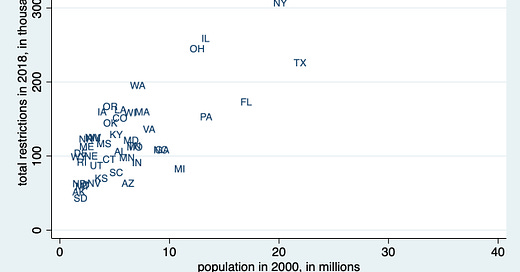24th May 2021. Regulation | Debt
Regulation increases when population increases: US student debt has mushroomed.
Welcome to Just Two Things, which I try to publish daily, five days a week. Some links may also appear on my blog from time to time. Links to the main articles are in cross-heads as well as the story.
#1: Regulation increases when population increases
There’s an intriguing note on the Marginal Revolution site to the effect that researchers have established A link between population size and levels of regulation. The data set is American states, and the surprising finding, therefore, is that Texas runs at the top end of the regulatory scale.
(Source: Larger polities are more regulated. Mercatus Working Paper)
There are, apparently, similar results for the smaller samples of Australian states and Canadian provinces. There’s a data point too; when population doubles, regulation increases by between 22% and 33%.
That number is interesting because it corresponds reasonably well to Geoffrey West’s finding (in Scale) that when a city doubles in size a range of social phenomena (goods and bands) increase by 15%—income levels, health outcomes, crime, and so on.
The researchers have a number of hypotheses:
Mulligan and Shleifer attribute it to a fixed cost of regulating; larger polities can spread this cost over more people, making the average cost of regulating cheaper, so they do it more. We note two other explanations: larger polities might have more externalities worth regulating, or if regulation produces concentrated benefits and dispersed costs, a larger population could make it harder for those harmed by regulation to organize collectively to oppose it.
In truth, these sound like the kinds of hypotheses economists would have.
So let’s suggest a couple more from outside all of the field.
Number one. That in lower population environments, people are more likely to know each other and regulation is done by agreement. This is, in effect, why Elinor Ostrom was right about the way in which commons are managed and Garrett Harding was wrong.
My son suggested a video that makes this point, more or less (17 minutes).
Or to take another example, the London Stock Exchange was able to work on the principle of “my word is my bond” for as long as brokers had to appear of the floor of the Exchange to conduct trades. The social and business cost of not honouring a deal was huge. Let’s not be too romantic about this, because there were costs to everyone else. Insider dealing was rife.
Number two. It’s about managing variety. This is down to Ashby’s Law—that the amount of variety in a system needs to be greater or equal to the amount of variety in the external environment.
Systems therefore both amplify the variety in their own environment and dampen the level of variety in the external environment. States with larger populations will have more interactions: the number of possible connections in a population n is (n(n-1)/2. It’s not exactly exponential, but it tends in that direction.
Regulation, therefore, is a way of damping the external environment and stabilising the business and social environment for everyone.
Pitch in: there may be better hypotheses. The original paper, which I have scanned lightly, can be accessed from here.
#2: Soaring American student debt
The Visual Capitalist site has a chart showing the state of household debt in the US. It’s not a pretty sight. Overall houseold debt has doubled since 2003, according to a helpful table in the post.
(Source: Visual Capitalist)
Student debt is now the second largest doesn’t look like a huge share of this, and it’s also increased five-fold since 2003–or by 550%.
Systems that change as quickly as this are always volatile, and when young people carry high levels of debt it has other, probably unintended, consequences (they become more risk averse, for example).
It also discourages young people from going to college, when we know that having more people in higher education has “public good” effects for society as a whole. (This view is contested but seems to be true).
I’m expecting political action to deal with this, sooner rather than later.
(Thanks to Ian Christie for the link).
j2t#10x
If you are enjoying Just Two Things, please do send it on to a friend or colleague.




